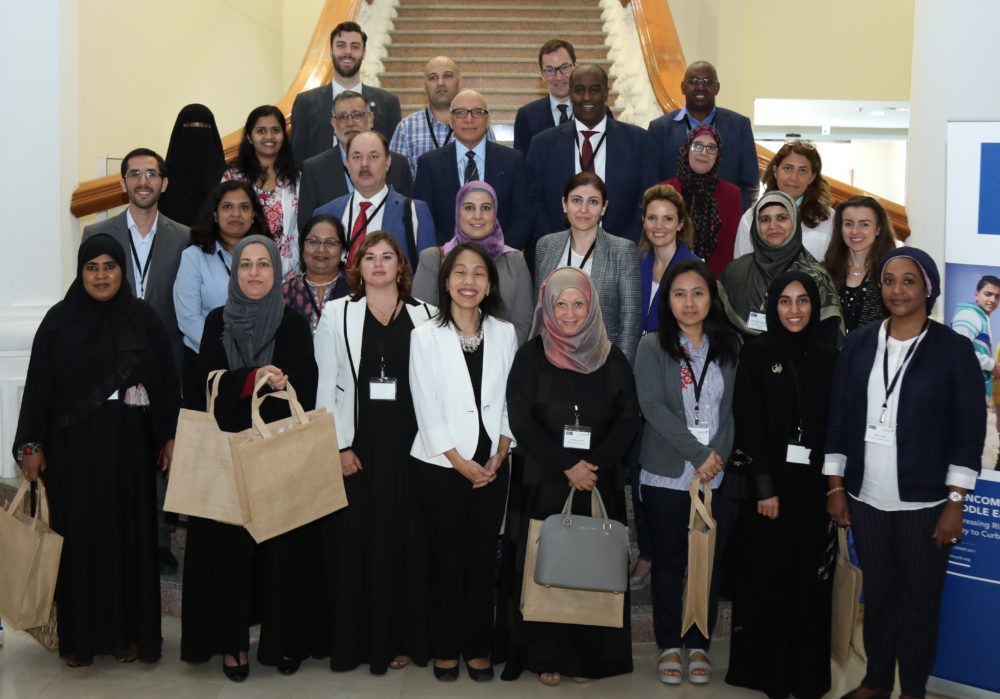Toshiko Kaneda
Technical Director, Demographic Research

January 25, 2018
Technical Director, Demographic Research
“If we can implement the right combination of effective and sustainable interventions to nurture healthy behaviors among youth today, then we can make progress toward curbing the NCD epidemic [in the MENA region] in one generation,” said Toshiko Kaneda, a senior research associate at the Population Reference Bureau (PRB), to an engaged crowd of around 70 people gathered at the American University of Sharjah in the United Arab Emirates (UAE) for the launch of PRB’s new report and data sheet on preventing noncommunicable diseases (NCDs) through curbing the risk factors among youth in the Middle East and North Africa (MENA).
 Among the nearly 70 attendees of PRB’s event in UAE were representatives from academia, civil society groups, government ministries, health authorities, and youth agencies from across UAE and other countries. All came together to learn more about PRB’s report on preventing noncommunicable disease risk factors among the region’s youth.
Among the nearly 70 attendees of PRB’s event in UAE were representatives from academia, civil society groups, government ministries, health authorities, and youth agencies from across UAE and other countries. All came together to learn more about PRB’s report on preventing noncommunicable disease risk factors among the region’s youth.
The PRB report, written by Kaneda and Sameh El-Saharty, program leader for human development in the Gulf Cooperation Council Countries at the World Bank, with support from the AstraZeneca Young Health Programme, examines the health threat posed to the MENA region by NCDs such as cancer, diabetes, cardiovascular diseases, and chronic respiratory diseases, and describes prevention strategies. The report and its accompanying data sheet include detailed country-level data on the four main NCD risk factors among youth: tobacco use, alcohol abuse, unhealthy diet, and insufficient exercise.
During the UAE event, Kaneda told representatives from academia, civil society groups, youth agencies, and MENA government ministries that youth in some of the region’s countries already have high levels of all four of the main NCD risk factors, and the share at risk is likely to rise further unless policies and programs are put in place to counter the trend.
These risk behaviors are often established in early adolescence and young adulthood, and they set the stage for NCDs later in life. All are modifiable behaviors. Focusing on MENA’s youth is critical because of the region’s large and growing number of young people, Kaneda told the crowd. Healthier young people not only alleviate burden on health care systems but are critical for building the human capital needed for economic growth and sustainable development, she said.
Kaneda pointed to a variety of the report’s recommendations, including policies such as cigarette taxes; the importance of involving young people, families, schools, and communities in addressing these issues; and strengthening data collection to most effectively identify needs and develop appropriate responses to combating them.
A diverse group of speakers underscored the need for immediate action and the importance of healthy and productive young people to MENA’s future. Speakers included Abedelaziz Saeed Bin Butti Almheiri, director of Sharjah Health Authority; Syed Shah, professor at the Institute of Public Health at United Arab Emirates University; Sarah Dalibalta, assistant professor at the American University of Sharjah; and Heba Barazi, assistant professor at Zayed University. Martin Blaxall, director of corporate brand and communications at AstraZeneca, emceed the event, and Liam Sollis, public health and advocacy manager for Plan International UK, provided the opening remarks.
 The presenters at PRB’s UAE launch event include, front row (left to right): Heba Barazi, assistant professor at Zayed University; Sarah Dilbalta, assistant professor at the American University of Sharjah; Syed Shah, professor at the Institute for Public Health at United Arab Emirates University; Abdelaziz Saeed Bin Butti Almheiri, director of Sharjah Health Authority; Sameh El-Saharty, program leader for human development in the Gulf Cooperation Council Countries at the World Bank; and Abdishakur Abdulle, associate director of the Public Health Research Center at New York University, Abu Dhabi; back row (left to right): Liam Sollis, public health and advocacy manager for Plan International UK; Martin Blaxall, director of corporate brand and communications at AstraZeneca; and Toshiko Kaneda, senior research analyst at Population Reference Bureau.
The presenters at PRB’s UAE launch event include, front row (left to right): Heba Barazi, assistant professor at Zayed University; Sarah Dilbalta, assistant professor at the American University of Sharjah; Syed Shah, professor at the Institute for Public Health at United Arab Emirates University; Abdelaziz Saeed Bin Butti Almheiri, director of Sharjah Health Authority; Sameh El-Saharty, program leader for human development in the Gulf Cooperation Council Countries at the World Bank; and Abdishakur Abdulle, associate director of the Public Health Research Center at New York University, Abu Dhabi; back row (left to right): Liam Sollis, public health and advocacy manager for Plan International UK; Martin Blaxall, director of corporate brand and communications at AstraZeneca; and Toshiko Kaneda, senior research analyst at Population Reference Bureau.
Helen Seibel, associate director of Global Community Investment at AstraZeneca, commented that “Through our Young Health Programme we invest in disease prevention activities that are focused on youth as a means to address the growing burden of NCDs worldwide. There is a lot we don’t know about youth and their risk behaviors. This report provides critical information to elevate NCD prevention and the youth agenda and drive awareness around the need for targeted, youth-led, and adolescent friendly interventions.”
Kaneda affirmed, “If we can help MENA’s young people reduce risk behaviors, we will help them reach their full potential, which in turn will reduce health care costs, and also enable them to more fully contribute to economic growth and vitality. So here we’re looking at a clear win-win situation. Our actions today for youth can set countries on a path toward continued economic growth and prosperity.”
